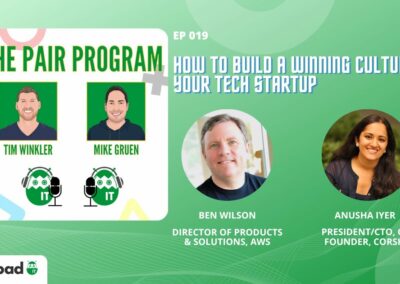Code Like a Girl was a Medium publication that was started in 2016 to amplify the voices of women in tech.
On October 1, 2020, Code Like a Girl became Empowered By Code.
ANNOUNCEMENT TIME!
Starting today, Code Like A Girl becomes Empowered by Code.
It’s an unfortunate truth that “Women in Tech” groups often leave out the perspectives of other people – people of color, Black people, LGBTQ+ people, disabled people, and nonbinary people.
— Code Like A Girl (@Code_likeagirl) October 1, 2020
We spoke with Olivia Mischianti, the owner of Empowered by Code, to learn more about the mission of the organization and why they made the transition.
The conversation below has been edited for length and content.
What was Code Like a Girl and how did you first get involved?
When I was in college, I was an editor for a satire magazine. It was nothing serious but I knew I had writing skills from that experience.
I saw people in the tech industry learning and sharing knowledge through their writing, and then getting feedback and engagement from the community.
I decided to publish an article on Medium called “Coding in College vs. The Real World”. I had just graduated and noticed some pretty major differences in the way things got done in academia vs. a professional environment.
Dinah Davis was the founder of Code Like a Girl and she commented on my article and asked if I wanted to submit it to their publication. That was the start of it.
Code Like a Girl was an organization that amplified women’s voices in tech.
When Dinah founded it, she saw a big space in the tech market for women’s voices.
So, she began the Medium publication along with the social media accounts and some Facebook groups.
Dinah did a great job of building community that way – sending hundreds of messages to ask people if they wanted to contribute and get more visibility for their pieces.
Over time, it gained popularity and started getting search engine traffic. As we got more traffic, we got more attention and more submissions.
How did you go from being a contributor to the owner?
I had submitted a couple of pieces for Code Like a Girl when Dinah posted that she was looking for an associate editor. I offered to help and, for a few years, helped vet all the posts that were coming in.
Then one day in the summer of 2020, Dinah sent me a message on Facebook asking me if I wanted to take over. She was busy, being a successful executive and woman in tech herself.
Two months later, I was the owner!
You recently announced that Code Like a Girl was becoming Empowered by Code. What is Empowered by Code and why are you making this transition?
We felt like we could be doing a lot more and our platform could be more inclusive.
The name “Code Like a Girl” came from the common insults we’ve heard like “you throw like a girl.” That phrase is often used to disparage people, including young boys.
We thought we could use our platform to empower more people and address challenges faced by those that don’t look or act like the stereotypical tech worker.
I noticed that women’s spaces are often dominated by white, able-bodied, cisgender, heterosexual women. There are a million different identities that intersect with being a woman in tech, and they all have an impact on the way people treat us.
I wanted Empowered by Code to be an open space where everyone was included.
Our platform is about learning, sharing knowledge, and getting paid.
Everyone in tech is constantly learning because it changes and grows so quickly. Often people learn by consuming the information that others are sharing – whether that’s in a course, a meetup, or a Medium article.
And we want to make sure women are getting fair payment.
Many people are drawn to tech because of the salary potential. I don’t think there’s any shame in that. Much of the empowerment in code is through the financial freedom it brings.
How are you looking to fulfill that mission?
Right now, the blog at Code Like a Girl is still there and will stay as is. I want it to be a part of what we’re doing with Empowered by Code.
Along with Medium, we’ve been focusing on Twitter because there’s a lively tech community there. We’re trying to engage with people and have conversations about how to get into tech, how to solve problems, and how to face challenges that engineers encounter.
We also share knowledge, particularly about how to get paid. We share negotiation tips and how to get paid for speaking gigs and other opportunities.





